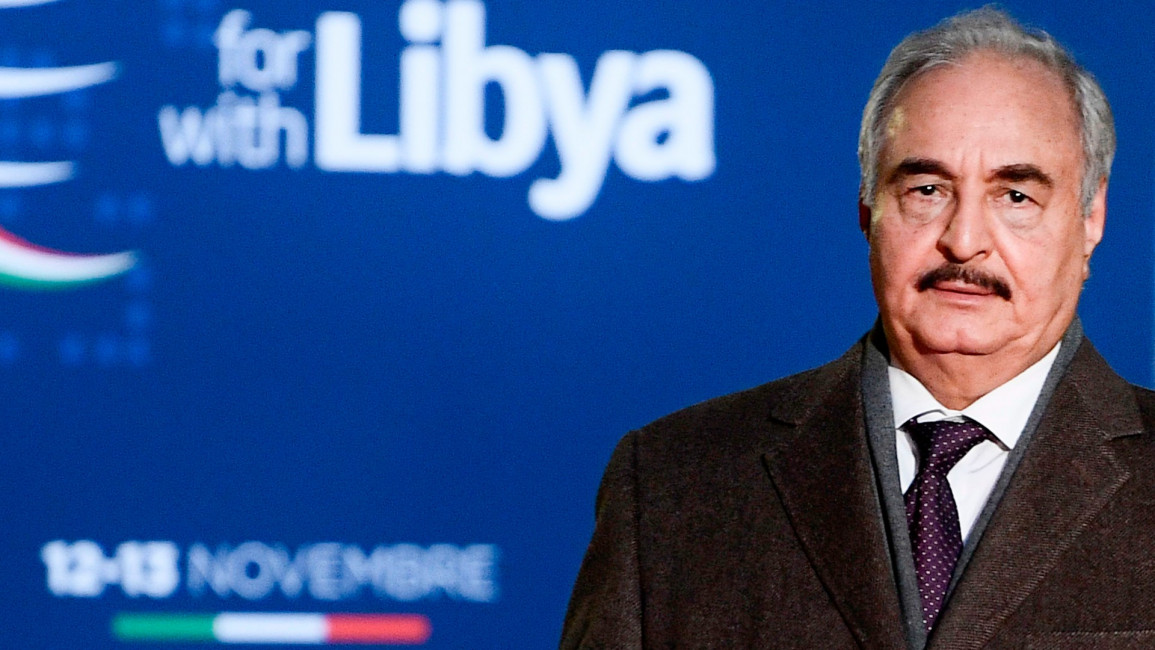Follow us on Facebook, Twitter and Instagram to stay connected
UAE weapon deliveries to Libya's Haftar 'escalated' after it agreed to uphold UN arms embargo
UAE weapon deliveries to Libya's Haftar 'escalated' after it agreed to uphold UN arms embargo
The UAE has been sending weapons to aid Libyan militia leader Khalifa Haftar in his failing campaign to take Tripoli.
4 min read
Haftar's militias are struggling [Getty]
The UAE is violating an arms embargo on Libya and continues to supply military equipment to militia leader Khalifa Haftar, according to a confidential United Nations report.
The UAE made over 150 flights to regions controlled by Haftar, mostly in eastern Libya, between January and April in what experts are calling an attempt to prop up the rebel leader's campaign against the UN-backed Tripoli government.
In particular, flights to Haftar-controlled zones shot up during his failed assault on Tripoli earlier this year, a diplomat with access to the unpublished report (prepared by a UN expert panel) told The Wall Street Journal.
UAE-supplied weapons, the report says, have proven crucial in Haftar's campaign and in his taking over of parts of eastern Libya.
The cargo, which was flown from the UAE using a US- built C-17 military transport plane was believed to be carrying ammunition and defence systems.
Weapons continued to be flown even after Haftar’s push into Tripoli failed, the diplomat said.
In addition to planes, the UAE has also been accused of using ships to ferry jet fuel to Libya allegedly for military purposes.
Regional conflicts
Abu Dhabi has "led" foreign intervention in Libya, and its decision to wade into the maelstrom of the country's civil war comes as several other countries have done the same.
"The UAE have been the leading spoiler in Libya since 2015," said Wolfram Lacher, a Libya expert at the German Institute for International and Security Studies.
According to the report, military supplies from the UAE "peaked" in late 2019 and early 2020 following Haftar’s failure against government forces. This came to an end in June after pro-government forces, supported by Turkey, pushed Haftar's forces away from the capital.
The UAE dispatched some 150 military flights using Russian-made cargo planes to eastern Libya and western Egypt, according to the UN report.
Turkey came out in support of the Tripoli government and has also been accused of violating the arms embargo set in place earlier this year.
Haftar is supported by the UAE, Russia, and Egypt while the Tripoli forces, while the Tripoli government has been bolstered by Turkey, which is a bitter rival of Egypt and the UAE in a broader regional struggle over political Islam.
|
Last week, a top UN official for Libya warned that the oil-rich country is at "a decisive turning point", with foreign backers of its rival governments pouring in weapons and the misery of its people compounded by the coronavirus pandemic that appears to be "spiralling out of control".
Acting special representative Stephanie Williams told the Security Council that its actions "will help determine whether the country descends into new depths of fragmentation and chaos or progresses towards a more prosperous future".
According to the report: "...Since the more direct engagement by Turkey in 2019 and the United Arab Emirates in January 2020 arms transfers to Libya by those two member states have been extensive, blatant and with complete disregard to the sanctions measures."
"The panel thus finds that Turkey and the United Arab Emirates were in repeated non-compliance" with the arms embargo, which has been in force since 2011, the report said.
The EU has made some effort punish those countries who violate the arms embargo.
Last week the EU sanctioned one Turkish and one Jordanian shipping company for taking military materials to Libya.
It also sanctioned Kazakh airline and Sigma Airlines, both of whom had been used by the UAE to fly weapons to Libya.
It is believed the UAE used a network of private companies to deliver arms to Libya. That way, researchers say, they could stay off the UN's radar.
One such example is when the UAE military allegedly used a private Dubai-based company called AAL Group to order seven Russian-made Mi-24 helicopters from the Czech Republic in 2015.
In 2016 a commander close to Haftar purchased 11 Mi-24 helicopters, including seven with the same serial number as the one purchased by the UAE from the Czech Republic, according to the WSJ.
It is unclear if the Czech-purchased helicopters were used in Libya, and the Emirati government invited Czech representatives to see the helicopters being used in the UAE as proof they would remain locally-used.
One thing remains clear: Mi-24 helicopters had been used by Haftar in recent confrontations, including the recent assault on Tripoli.


![Minnesota Tim Walz is working to court Muslim voters. [Getty]](/sites/default/files/styles/image_684x385/public/2169747529.jpeg?h=a5f2f23a&itok=b63Wif2V)




![Debris near Rafic Hariri International Airport [Getty]](/sites/default/files/styles/image_330x185/public/2176162423.jpeg?h=a5f2f23a&itok=MCSK9mkM)
![An Israeli air strike on Jabalia killed teenage journalist Hassan Hamad [Screengrab/X]](/sites/default/files/styles/image_330x185/public/2024-10/hassan%20hamad1.jpg?h=c12e0b96&itok=Rd_dyCVp)
